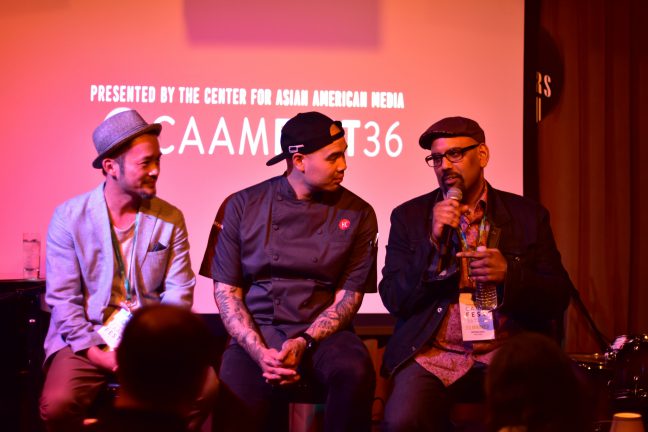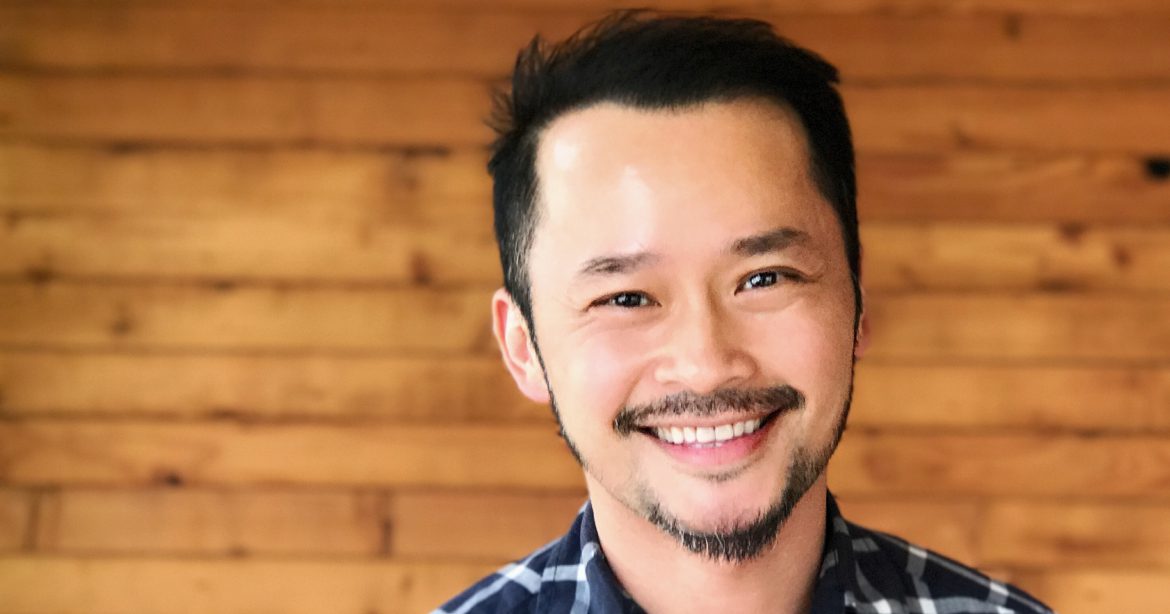We chat with filmmaker James Q. Chan, who directed the Emmy-nominated documentary FOREVER, CHINATOWN. Chan recently premiered two films at CAAMFest36: the debut episode in a new food series, FIRST KITCHEN: BLOODLINE WITH CHEF TU DAVID PHU and POWER IN UNITY, a film about elders in SF Chinatown organizing for housing rights.
Chan talks about his background as a refugee due to the Vietnam War, his influences from working at a talent agency and documentary production company, and ways he stays healthy through stressful times.
This post is sponsored by the California Department of Public Health, who are proud sponsors of our CAAMFest36 presentation of James Q. Chan’s POWER IN UNITY. They are spreading the word to parents about the dangers of flavored tobacco products, including e-cigs, which more and more kids use because they come in flavors like mango and strawberry. In fact there are over 15,000 e-cigarette flavors on the market, many of which are enticing to kids. And, 80% of kids who ever used tobacco started with flavored tobacco. All tobacco products are toxic and highly addictive. Visit FlavorsHookKids.org for more info.
Can you talk about how you got into filmmaking?
I started out thinking I wanted to be an actor which led me to a talent agency in San Francisco. Instead of getting representation, I applied and was hired for an assistant job to an agent and quickly knew the acting hustle wasn’t for me. As the agency grew, I put college on hold to take a promotion as a SAG/AFTRA union agent overseeing the commercial, television and film, and voice-over departments. My frustration over the limited number of positive roles for API performers grew and I knew if I wanted to have an impact in mainstream media’s representation of our community, it was going to be from behind the camera. I left the agency, spent a year back-packing through Southeast Asia (India, Nepal, Vietnam), came back broke but inspired, looked at several film schools, then landed an entry level position with Rob Epstein and Jeffrey Friedman’s documentary production company, Telling Pictures. My hands-on training and mentorship as a film producer with Esptein and Friedman was set against the backdrop of the defining decade of the 2000s; anti-war protests, natural and man-made disasters, the growth of internet, financial crisis and recession, and personally losing two beloved family members due to separate tragic accidents. Telling Pictures had a robust video library (on VHS!) and I devoured all of Epstein and Friedman’s work (The Times of Harvey Milk, Common Threads, The Celluloid Closet) in addition to other esteemed documentary films including Arthur Dong’s Sewing Woman which had an immense impact on me. It was there at Telling Pictures where the entire sum of me expanded and contracted through the healing power of documentary films.
Can you talk about your family’s background, and how that influences the types of stories you tell?
My family and I are refugees because of the Vietnam War. We have roots from China, Vietnam, a refugee camp in Indonesia, and early years in the Midwest. My sensibilities as a filmmaker is shaped by my working class background, as a latchkey kid from the 80s in S.F., nature shows, 90s hip-hop, and memories of my mom’s cooking.

I’d love to hear more about your food series, First Kitchen. How did you become a part of that project, and how is your series different from other food stories?
First Kitchen is a short-form documentary series about the origin of taste and tongue, focusing on the art and ancestry of food, spotlighting individuals working in and around the industry, from a chef to a farmer to inmates at San Quentin, exploring how food has shaped the world, and their place in it.
First Kitchen aims to explore how “first experiences” with food shape our worldview, essentially tracking the evolution of “food consciousness” through a variety of personal stories. Our goal is to move beyond binary perspectives of surplus (i.e. chefs, eaters) and scarcity (i.e. starvation, hunger), to include a greater diversity of stories and voices in the discussion of how food influences and affects society.
First Kitchen is created by the brilliant Santhosh Daniel (Open Account, Project Advisor on Forever, Chinatown). When I was approached by Santhosh and Tu David Phu (Top Chef), two of the loveliest men on the planet, I immediately said yes to their refreshing vision and goals of the series.
What is your favorite part about filmmaking?
I am beyond grateful for each of my storytellers who go in front of my camera to share their stories. It is a true blessing for me to meet and validate them at a point in their lives when they are emotionally available.
Are there other projects down the line that you can talk about?
I have a couple of Chinatown community based projects that I’m developing including a focus on youth media. Most immediate is a special film, Chinatown Rising, documenting the birth of the Asian American Movement, seen through exquisite never before seen 16mm footage filmed during the 60s-80s by local resident and activist Harry Chuck. I’ll be going back to my roots as a producer to assist Harry in telling his story. This is my second CAAM funded project and we anticipate finishing the film by this Fall 2018.

A lot of your films focus on Chinatown communities. It’s also a place that is often overlooked, and there are, historically, a lot of stereotypes. Your films really disrupt that narrative. Congrats on your recent Emmy nomination for Forever, Chinatown. Can you talk about what have been peoples’ responses to the film?
Thank you very much! I live in Chinatown and I serve my community through film so this nomination is already a win not only for my team and I but also for our beloved Chinatown community. Not that our community needs an outside validation that our stories are cinematic with depth and worthy of preservation, there’s something extra special about being recognized on such an esteemed level from telling our own stories from our own point of view. Especially for the many youth who live in Chinatown this is important because if you can’t see it, you can’t be it. Immense gratitude to CAAM because you have been on the front lines championing stories from our API community from the get go and Forever, Chinatown couldn’t have gotten to this point without you.
As for people’s responses, our screenings have included San Francisco’s Chinatown, North Carolina, Texas, Hawaii, New Zealand, Philippines and Poland. Audiences have shared their moving personal family stories during Q&A’s, and some have returned to second screenings with their family members. Asian Pacific Islander health professionals who serve their community have said our film is a great visual aid in highlighting the complex dynamics of growing up in an ethnic minority, while local politicians and community organizations have reported that the film invites policy makers to actually sit through an entire film about gentrification and redevelopment, and be emotionally moved. The most touching moment was perhaps our packed screening in Vietnam at Hanoi Cinematheque where a tearful Mr. Saadi Salama, Ambassador of the State of Palestine, used our film to illustrate the importance of film in preserving community and culture.
Wow. During busy times, what are some ways in which you practice self-care?
For the past four years, I’ve been practicing Tai Chi Chuan and a year ago began training in Shaolin Kung-Fu. My training is with Simu Kuo, a sweet but also tough as nails, 72 yr old master at her Lien Ying Academy in SF Chinatown. In busy times, she still insists that I make it to the studio twice a week.
As you know, the California Tobacco Control Program is a sponsor of the Power in Unity screening. What do you hope people gain from watching your films, including Power in Unity, which just played at CAAMFest36?
Call your mama. Then look around you at all the human pillars within your community and find a way to be of service to them.
Within the Chinese and Chinese American community, there’s a lot of tobacco use. What are your thoughts on this, and do you have anything you’d want to share regarding tobacco?
Cigarette smoking, especially for men in our culture, is ingrained. Elders offer cigarettes as a part of etiquette, and it’s normalized. I think to reach this community, there will need to be targeted research.
My dad smoked for many, many years, and it was because of me that he stopped. He smoked in the house and finally, I couldn’t tolerate it. I had asthma. I was in elementary school then. So he quit cold turkey for me.
It wasn’t until my adult years that I picked it up especially during my travels. I kept this from my Dad as he would’ve killed me. My practice in Tai Chi and Shaolin was the main reason I was able to quit for good. I’m all for the anti-tobacco campaign and getting it as far removed from youth as possible.
Is there anything else you would like to add?
I heart CAAM!
+ + +
For help on how to quit smoking, the California Smokers’ Helpline offers free telephone counseling, self-help materials, and online help in six languages. Visit www.nobutts.org or call 1-800-NO-BUTTS.

Thank you to our Sponsor, the California Department of Public Health, for their support of CAAMFest36, ANATOMY OF A MUSIC VIDEO with RUBY IBARRA, POWER IN UNITY, and the All-Access Pass giveaway (shoutout to our Festival All-Access Pass Winner, Rebecca Ming-Yoke Hom!) As we wrap up our campaign, Sierra Lee, CAAM Development Manager, reflects on some of the lessons we took away from participating in the Flavors Hook Kids campaign.
Why did you pair POWER IN UNITY with the Flavors campaign?
POWER IN UNITY is about the Chinese American community organizing to protect their housing rights. Historically, Asian Americans are seen as apolitical or politically invisible. However, we have a long history of activism and organizing that can turn the legal, cultural, and political tides. Similarly, we can make waves within our own communities by advocating for better health practices, access to information, and pushing against campaigns that target the well being of our communities.




